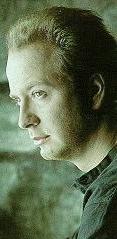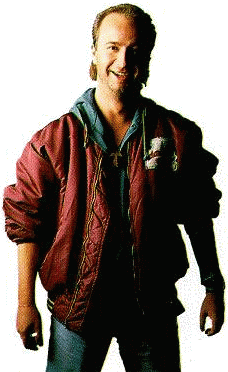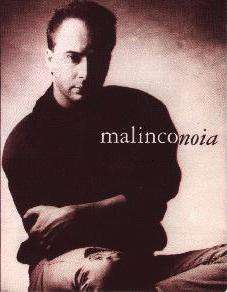Biography
 Marco Masini was born
in Florence, Italy on the 18th of September 1964, under the sign
of Virgo. When he was only 6 years-old he received, as a present,
his first piano. As soon as he put his hands on it, he played by
ear the melody of "White Christmas." His Uncle Enrico,
listening to him, suggested to Marco's parents that they let the
child study music because he had an extraordinary talent. So
Marco took piano lessons for five years. The music soon became
the center of his life. His mother thought that little Marco had
a possible future as a classical music concert pianist. She
didn't imagine that her son's concerts would be a bit
different...
Marco Masini was born
in Florence, Italy on the 18th of September 1964, under the sign
of Virgo. When he was only 6 years-old he received, as a present,
his first piano. As soon as he put his hands on it, he played by
ear the melody of "White Christmas." His Uncle Enrico,
listening to him, suggested to Marco's parents that they let the
child study music because he had an extraordinary talent. So
Marco took piano lessons for five years. The music soon became
the center of his life. His mother thought that little Marco had
a possible future as a classical music concert pianist. She
didn't imagine that her son's concerts would be a bit
different... 
His debut occurred when he was only 11 years-old, at
the Romola Plaza, in the province of Florence during a fair of
the town's patron saint. The orchestra didn't have a pianist and
they were searching for someone. The little Marco presented
himself and engaged, playing the piano with the orchestra in the
presence of all the townspeople. Astonished, his parents, said to
each other, "We have created a sensation."
Later, Marco joined a musical group called
"Errata Corrige" and he started touring dance-halls in
the suburbs. It was a tiring life, and a hard living -- sound
checks, song writing and assembly and disassembly of the musical
equipment. It was a life of wandering. In the morning, Masini
would be at school but, in the afternoon and in the evening he
would be out playing with "Errata Corrige."
Marco had to forsake playing soccer, his other big
passion, when he was 15 years-old. The Florentine soccer team,
"The Fiorentina," called him to tryout as a Goalkeeper,
but he had to decline because of his music. He decided to also
forsake school, and decided to dedicate himself to his music. 
At that time, many disagreements and disputes started
with his father, who wanted his son to be an accountant. His
father wanted to make him finish school saying, "The way of
music is uncertain. it's better and more secure to be an
accountant". To calm his father, Marco worked as a salesman
for one year.
Then, in 1980, his parents set up a bar. Marco,
together with his sister Susanna, helped out in the bar in the
mourning. At night he continued to play. But the disputes with
his father were getting worse.
Suddenly, his parents sold everything. Marco's mother
had a tumor. After four struggling years, she died on the 22th of
August 1984. Sustained by a great faith, her last words to Marco
were, "I die. I go to God." Marco felt lost. He weighed
the pros and cons of a life lived as a vagabond -- between school
that he couldn't stand and the music that he didn't see would get
him anywhere. Finally, he decided to move to Modena, because
Florence didn't seem to him to be a city where someone with
talent could make it. He stayed in Modena for six months and
worked as an arranger of disco music and as a DJ.
Going back to Florence, he started to play in the
pianobars. His boss, Bob Rosati, one day encouraged him to sing.
"Marco," he insisted, "I can't take it
any longer. Either you learn to sing or we'll have to give
everything up. You are a complete orchestra by now because you
know how to play every instrument. The only thing left for you is
to sing. A talented person like you won't have problems." 
So Marco, at age 21, started to sing seriously,
relieving Bob during the evening. Suddenly, Marco was seized by
the strong desire to sing, to write songs and vent his feelings
accumulated frustrations.
At that time he met Beppe Dati. Together, they made a
few pieces of music based on a deep lyrical language, that
touched the heart of common teen problems. These years were full
of disappointments and rejections. Nobody would give Marco
credit. The record companies said to him, "With this
physique, with this ugly look, where do you want to go? And don't
you hear what other people's songs are about? They sing about the
sun, the sea, and beautiful girls. Who cares about how you feel
about your daddy?"
Then he met Giancarlo Bigazzi, one of the most
important Italian songwriters. Bigazzi heard Marco sing and liked
him. So, he introduced Marco to Umberto Tozzi, a popular Italian
singer. Soon Marco went on tour as a pianist for Tozzi's
concerts.
In the meantime, Marco reconciled his differences with
his father.
Finally the record companies granted Marco a bit of
credit and he decided to participate in the Festival of Sanremo -
the biggest Italian singer competition. That year he didn't win
and another singer took first place.
But, Marco didn't give up. In 1990 his turn to win
finally would come. Marco wrote the music for
"Disperato" and then worked on the lyrics with Bigazzi
and Dati. It was an emotional song laden with deeply felt
desperation. Marco performed in the Festival of Sanremo, in the
section of promising young singers. He beat everyone. "I
knew it, daddy!" he exclaimed to his father by telephone.
His father didn't believe in Marco, especially that he would ever
be successful in music. Years of struggles and sacrifices and the
success had finally arrived! Marco Masini became the biggest
musical success of the year. He made his first album, "Marco
Masini," composing, with Bigazzi, eight pieces of great
beauty and poetry. 
The next year he went back to the Festival at Sanremo.
But this time he was in the big Popular Singer's section. Marco
decided to turn his attention to the drug problem in a more
direct way, with "Perchè lo fai." He placed third, but
his new album "Malinconoia" was a hit. Marco went on
his first tour. Then he tried his luck in Spain and made a
Spanish version of nine of his songs. The album was entitled
simply "Marco Masini," like his first Italian album. In
Spain, the album was a big success. 
Back in Italy he started to undergo many criticisms.
Some critics said that he was a symbol of misfortune -- a loser,
a pessimist, a corrupter of teenagers, a singer that sang about a
life too black, a singer that led his listeners into depression
and even to suicide!! Many guys started to think he was only a
moaner. His critics didn't notice that every day Marco Masini
received dozens of letters from teenagers telling him how much
his songs were a relief in moments of discouragement. Besides
many drug-addicts, teenagers told him in their letters that his
songs helped themselves realize where they were and that they
wanted to crawl out of the pit of drugs.
After two years of silence Marco couldn't can't keep
his temper any longer. Although his collaborators warned him that
he might ruin his image, Marco vented his rage in a song called
"Vaffanculo" (in English "fuck off"). He
included the song in his new album, "T'innamorerai,"
upsetting the critics. He also made the Spanish version of the
album, "T'enamoraras." 
In 1993 he went on tour in Italy and this time, toured
the rest of Europe.
In 1995 he published his album "Il cielo della
Vergine" together with the Spanish "El cielo de
Virgo." In Italy the critics slammed him for "Bella
Stronza," because of its vulgarity. Another song,
"Principessa," was a moving story against incest, but
was also criticized for its vulgarity.
The 1995 Marco Masini went on his third world tour.
The 14th of November of 1996 the compilation
"L'amore sia con te" came out in Italy. It contains
some of the most important Masini songs, and lets Marco fans take
stock of the last six years, in which he had big successes. Marco
also published the Spanish version of this compilation.
A new tour and album are both expected in 1997.


 Marco Masini was born
in Florence, Italy on the 18th of September 1964, under the sign
of Virgo. When he was only 6 years-old he received, as a present,
his first piano. As soon as he put his hands on it, he played by
ear the melody of "White Christmas." His Uncle Enrico,
listening to him, suggested to Marco's parents that they let the
child study music because he had an extraordinary talent. So
Marco took piano lessons for five years. The music soon became
the center of his life. His mother thought that little Marco had
a possible future as a classical music concert pianist. She
didn't imagine that her son's concerts would be a bit
different...
Marco Masini was born
in Florence, Italy on the 18th of September 1964, under the sign
of Virgo. When he was only 6 years-old he received, as a present,
his first piano. As soon as he put his hands on it, he played by
ear the melody of "White Christmas." His Uncle Enrico,
listening to him, suggested to Marco's parents that they let the
child study music because he had an extraordinary talent. So
Marco took piano lessons for five years. The music soon became
the center of his life. His mother thought that little Marco had
a possible future as a classical music concert pianist. She
didn't imagine that her son's concerts would be a bit
different... 




